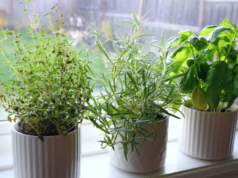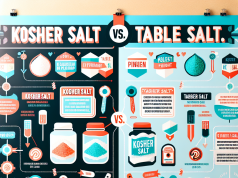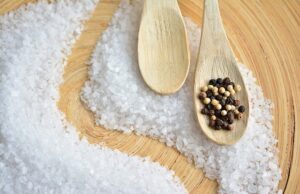Contents
10 Easy Ways to Incorporate Herbs into Your Everyday Cooking
Herbs are an essential ingredient in many dishes, adding flavor and depth to your meals. Here are ten easy ways to incorporate herbs into your everyday cooking:
- Add herbs to eggs: Whether you’re making scrambled eggs or an omelette, try adding some fresh herbs like chives, parsley, or thyme to bring out the flavors.
- Make herb-infused oils: Infuse olive oil with your favorite herbs to use in salad dressings or as a finishing oil for roasted vegetables.
- Bake with herbs: Try adding herbs like rosemary or sage to your bread or biscuit dough for a flavorful twist.
- Add herbs to soups and stews: A handful of fresh herbs like basil, oregano or parsley can take a simple soup or stew to the next level.
- Garnish with herbs: Use fresh herbs to garnish your dishes, like chopped cilantro on tacos, or basil on pizza.
- Make herb butter: Whip butter with herbs like dill, chives or garlic to add flavor to bread or as a topping for grilled meats.
- Create herb-filled salads: Toss fresh herbs like mint, basil or parsley with your favorite greens for a flavorful salad.
- Grill with herbs: Use herb branches like rosemary or thyme as skewers for grilled vegetables or meats.
- Make sauces with herbs: Use fresh herbs like basil or sage to make a homemade marinara sauce or creamy pesto sauce.
- Brew herb tea: Make tea using fresh herbs like mint, chamomile or lavender for a relaxing drink.
These are just a few easy ways to incorporate herbs into your everyday cooking. Experiment with different herbs and dishes to find your perfect flavor combinations!
Introduction
Herbs are an important addition to any dish as they add flavor while providing various health benefits. Some herbs even have medicinal properties. In this blog post, we will discuss 10 easy ways to incorporate herbs into your everyday cooking.
1. Add Fresh Herbs to Salads
Fresh herbs like parsley, basil, and mint can add a burst of flavor to a simple salad. Simply chop them up and sprinkle them on top of your greens for a delicious and nutritious addition to your diet.
2. Make Herb Butter
Herb butter is a great way to add flavor to any dish. Simply mix softened butter with your favorite herbs like rosemary or thyme and spread it on bread or use it to flavor your cooking.
3. Infuse Olive Oil
Infused olive oil is a fantastic way to add flavor to your cooking without adding any extra calories. Simply heat up some olive oil and add your favorite herbs like oregano or tarragon. Let it cool and strain the herbs out before using in your recipes.
4. Add Herbs to Marinades
Marinades are a great way to add flavor to meats and vegetables. Adding herbs like thyme or rosemary to your marinade can add a delicious and aromatic flavor to your cooked dishes.
5. Make Herb Pesto
Herb pesto is a versatile condiment that can be used in many dishes. Simply blend fresh herbs like basil or parsley with garlic, pine nuts, parmesan cheese, and olive oil in a food processor to create a delicious pesto sauce.
6. Use Herbs to Flavor Roast Vegetables
Roasted vegetables are a great, healthy side dish. Adding herbs like thyme, rosemary, or sage can add a flavorful twist to your roasted veggies, making them even more delicious!
7. Create Herb Salt
Herb salt is a fantastic seasoning for any dish. Simply mix salt and dried herbs like rosemary, thyme, or oregano in a food processor to create an herb-infused salt.
8. Top Your Pizza with Fresh Herbs
Adding fresh herbs like basil or oregano to your homemade pizza can take it to the next level. Simply chop them up and sprinkle them on top of your pizza before baking for an extra layer of flavor.
9. Make Herbal Tea
Herbal tea is a great way to enjoy the benefits of herbs in a warm and soothing drink. Simply steep your favorite herbs like chamomile or lavender in hot water for a few minutes for a relaxing and tasty beverage.
10. Add Herbs to Your Smoothies
Herbs like parsley or mint can add a refreshing twist to your morning smoothie. Simply blend them up with your favorite fruits and veggies for a nutritious and delicious drink.
Conclusion
Incorporating herbs into your everyday cooking is a great way to add flavor while providing various health benefits. By using these 10 easy ways to incorporate herbs into your cooking, you can elevate your meals to the next level without much extra effort.
References:
To learn more about the health benefits of herbs, check out this article from Healthline.
FAQs: 10 Easy Ways to Incorporate Herbs into Your Everyday Cooking
1. What are some common herbs that I can use in my cooking?
Some common herbs include basil, parsley, thyme, rosemary, oregano, chives, mint, and cilantro.
2. How do I store fresh herbs?
You can store fresh herbs in the refrigerator by placing them in a plastic bag with a damp paper towel. Or, you can also freeze them in airtight containers or ice cube trays with some water or olive oil.
3. How do I know which herbs go well with which dishes?
You can do some research online or in cookbooks, or you can experiment by adding small amounts of different herbs to your dishes and see what works well together.
4. What are some easy ways to incorporate herbs into my everyday cooking?
- Make a herb-infused oil or vinegar to use as a dressing or marinade.
- Add fresh herbs to your salad greens.
- Sprinkle chopped herbs over your cooked vegetables or roasted meats.
- Mix herbs into your mashed potatoes or roasted vegetables.
- Add fresh herbs to your omelette or scrambled eggs.
- Mix herbs into your soup or stew.
- Slice a lemon and add some herbs before roasting your chicken or fish.
- Brew fresh herb tea or add it to your water.
- Add herbs to your homemade pizza or pasta sauce.
- Make herb butter by mixing chopped herbs into softened butter.
5. How much herbs should I add to my dishes?
It depends on your taste preference and the dish you’re making. Start with a small amount and taste as you go until you find the right balance of flavors.
6. Can I use dried herbs instead of fresh ones?
Yes, you can use dried herbs instead of fresh ones, but remember that dried herbs are more concentrated, so you’ll need to use less of them than fresh ones.
7. Can I grow my own herbs?
Yes, you can grow your own herbs in your garden or in containers in your kitchen or balcony.
8. Where can I buy fresh herbs?
You can buy fresh herbs at your local farmers market, grocery stores, or online herb shops.
9. Are herbs healthy?
Yes, herbs are low in calories and are rich in antioxidants, vitamins, and minerals, which makes them a healthy addition to your diet.
10. Can I use herbs in desserts?
Yes, you can use some herbs in desserts, such as mint in chocolate desserts or lavender in cakes and cookies.
Why Use Herbs in Your Kitchen?
Herbs are an essential part of cooking that can add a burst of flavor to any dish. They are not only beneficial for your taste buds but also for your health. Incorporating herbs into your daily meals can provide many health benefits.
Health Benefits of Herbs
Herbs have been used for centuries to treat various ailments. Here are some common herbs found in many kitchens and their health benefits:
- Garlic: Known for its antibacterial and antifungal properties, garlic can help boost your immune system and lower your risk of heart disease.
- Basil: This herb is packed with antioxidants, which can help protect your body from free radicals that can cause cancer and other diseases.
- Cilantro: Cilantro has been found to have anti-inflammatory properties, which can help reduce pain and swelling in the body.
- Parsley: Parsley is a great source of vitamin K, which is essential for building strong bones and preventing blood clots.
- Mint: Mint has been used for centuries to aid in digestion and soothe upset stomachs.
These are just a few examples of the many health benefits of herbs. By incorporating these into your daily meals, you can help improve your overall health and well-being.
Wikipedia Link
For more information on the benefits of herbs, check out the Herbs page on Wikipedia.
10 Easy Ways to Incorporate Herbs into Your Everyday Cooking
- Add fresh herbs to salads for extra flavor and nutrition.
- Use herbs as a garnish for soups and stews.
- Make herb-infused oils for cooking and salads.
- Create herb-based pesto for pasta dishes or as a dip.
- Add herbs to marinades for meats and vegetables.
- Use herbs in homemade salad dressings and marinades.
- Make herb butter for spreading on bread or using in cooking.
- Use herbs to season roasted vegetables for a flavorful side dish.
- Make herb-infused vinegars for dressing salads or as a marinade.
- Use herbs to add flavor to homemade sauces and dips.
Category – Pepper, Salt and Herbs








































